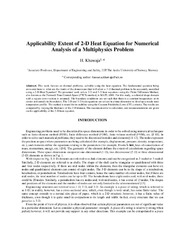| dc.contributor.advisor | Lorentsen- Dybdal, Anne-Berit | |
| dc.contributor.author | Krey, Camilla Iselin | |
| dc.date.accessioned | 2024-07-12T05:40:43Z | |
| dc.date.available | 2024-07-12T05:40:43Z | |
| dc.date.issued | 2024-05-15 | en |
| dc.description.abstract | Temaet for studien omhandler hvordan barnevernet kan forstå kompleksitet og hjelpebehovet til familier ved å ta i bruk et hverdagslivsperspektiv. Studiens formål er å undersøke hvordan barnevernstjenestens bruk av et hverdagslivsperspektiv kan gi en helhetlig forståelse av familienes hverdag, og behov for hjelp. Undersøkelsens funn baseres på kvalitative forskningsintervju med sju saksbehandlere fra det kommunale barnevernet. En fenomenologisk og hermeneutisk tilnærming ble anvendt, og datamaterialet ble analysert ved hjelp av tematisk analyse.
Oppgavens problemstilling er:
Hvordan kan anvendelse av et hverdagslivsperspektiv i barneverntjenesten bidra til å forstå hjelpebehovet til familier med komplekse problem?
Samlet viser studiens funn at et hverdagslivsperspektiv kan bidra til å belyse hvordan familier med komplekse problem håndterer egen hverdag, og hvordan familiens behov og utfordringer kan forstås ut fra deres egne erfaringer. Perspektivet kan gi barnevernstjenesten en dypere forståelse av familiens situasjon, identifisere skjulte barrierer og konsekvenser av sosioøkonomisk knapphet, og tilrettelegge for en mer helhetlig og tilpasset tilnærming av barnevernets praksis. | en_US |
| dc.description.abstract | Abstract
The theme of the study revolves around how child welfare services can understand the complexity and support needs of families by adopting an everyday life perspective. The purpose of the study is to examine how the use of an everyday life perspective by child welfare services can provide a comprehensive understanding of families' daily lives and their need for assistance. The findings of the study are based on qualitative research interviews with seven caseworkers from municipal child welfare services. A phenomenological and hermeneutic approach was employed, and the data were analyzed using thematic analysis.
The research question is:
How can the application of an everyday life perspective in child welfare services contribute to understanding the support needs of families with complex problems?
The study's findings collectively indicate that a perspective on everyday life can help shed light on how families with complex issues manage their daily lives and how the family's needs and challenges can be understood based on their own experiences. This perspective can provide the child welfare services with a deeper understanding of the family's situation, identify hidden barriers and consequences of socioeconomic scarcity, and facilitate a more comprehensive and tailored approach to the practices of child welfare. | en_US |
| dc.identifier.uri | https://hdl.handle.net/10037/34147 | |
| dc.language.iso | nob | en_US |
| dc.publisher | UiT The Arctic University of Norway | en |
| dc.publisher | UiT Norges arktiske universitet | no |
| dc.rights.holder | Copyright 2024 The Author(s) | |
| dc.rights.uri | https://creativecommons.org/licenses/by-nc-sa/4.0 | en_US |
| dc.rights | Attribution-NonCommercial-ShareAlike 4.0 International (CC BY-NC-SA 4.0) | en_US |
| dc.subject.courseID | BVE-3940 | |
| dc.subject | barnevern, hverdagslivsperspektiv, hverdagsliv, kompleksitet, sosioøkonomiske utfordringer, komplekse problem, sammensatte problem, organisatoriske rammer, barnevernsansattes handlingsrom. | en_US |
| dc.subject | child welfare, everyday life perspective, everyday life, complexity, socioeconomic challenges, complex problems, compounded issues, organizational frameworks, child welfare professionals' discretion. | en_US |
| dc.title | Hverdagslivet til familier med komplekse problem i kontakt med barnevernet En kvalitativ studie om hvordan anvendelsen av et hverdagslivsperspektiv i barneverntjenestens kan bidra til å forstå hjelpebehovet til familier med komplekse problem | en_US |
| dc.type | Master thesis | en |
| dc.type | Mastergradsoppgave | no |


 English
English norsk
norsk



